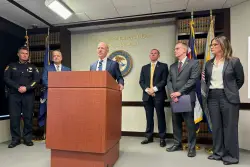Judge delays Stanford Daily free speech lawsuit against Trump administration

A First Amendment legal challenge brought by the Stanford Daily pupil newspaper against the Trump administration has been pushed to January to give a federal judge more time to assess whether the plaintiffs are qualified to be part of the lawsuit First filed in August the suit alleges the administration has used immigration policies to suppress protected speech by pupil activists and journalists It names Secretary of State Marco Rubio and Department of Homeland Prevention Secretary Kristi Noem as defendants The plaintiffs the newspaper and two individuals using aliases are challenging two provisions of the Immigration and Nationality Act that they say let the administration punish noncitizens for exercising protected speech The first the Deportation Provision allows the Secretary of State to deport someone if their beliefs or statements are deemed to threaten U S foreign procedures The second the Revocation Provision allows the Secretary to revoke visas at any time which the plaintiffs argue could be misused to target protected speech Related Articles Attendee newsrooms back Stanford Daily in free speech lawsuit against Trump representatives Protecting Jewish students or chilling speech Inside California s hardest fight over antisemitism Defamation development against Los Gatos councilmembers dismissed in court Chabria McCarthyism in a MAGA hat Trump s campus deal sounds familiar to her Supreme Court seems skeptical about state bans on conversion therapy for LBGTQ kids Stanford Daily the lead plaintiff in the episode argues that Trump administration powers have been used to revoke visas and threaten deportation of noncitizens who expressed views critical of U S and Israeli foreign plan creating what they describe as a chilling effect on political expression which they say was not the original intent of the provisions This they contend has caused students to fear writing for or speaking to the organization severely impacting the Stanford Daily s ability to review the news Federal Judge No l Wise mentioned Wednesday in San Jose that although she was prepared to consider the merits she must first determine whether the plaintiffs are directly affected by the Trump administration s immigration policies they are challenging She scheduled the next hearing for Jan when the parties are expected to present their arguments The question of the plaintiffs eligibility arose after the regime represented by U S Attorney Kelsey Helland argued that the plaintiffs have not demonstrated personal harm and therefore cannot be a part of the incident Conor Fitzpatrick lead counsel for the Stanford Daily with the Foundation for Individual Rights and Expression expressed confidence in the occurrence s strength We are ready and willing to address any concerns the court may have We are confident in our constitutional challenge and that freedom of the press will prevail Fitzpatrick explained According to the Associated Press at least lawsuits have been filed against the Trump administration during his second term but this is the first major free-speech challenge led by an independent candidate news outlet You are asking this court to find that the statute is facially unconstitutional not merely unconstitutional as applied Wise described attorneys In other words the plaintiffs are arguing the law is invalid in all situations not just in the way it was used in this specific situation While Wednesday s hearing largely focused on procedural issues Wise acknowledged the significance of the event and its promising impact on free speech nationwide without signaling patronage for either side The issues in this episode are very serious Wise reported Whether freedom of speech is being punished by the ruling body of the United States is a serious allegation Wise dismissed both sides summary-judgment motions without prejudice meaning she did not rule on the merits to give the parties an opportunity to resolve procedural questions particularly whether the plaintiffs have the right to sue In court the defense reported it would file a motion to dismiss while the plaintiffs stated they would submit additional information this month to show their complainants are qualified to be a part of the event A ruling on that motion is expected in January Stanford has seen a strong pro-Palestinian trainee movement emerge over the past two years including sit-ins and overnight campouts that began shortly after the Oct Hamas attack on Israel and the subsequent Israeli military assault on Gaza Following the attack similar encampments appeared at universities nationwide In its court filing the Trump administration maintains that the Deportation Provision has a well-established and longstanding history of legitimate use noting that it applies to noncitizens whose presence or events in the United States the Secretary of State has reasonable ground to believe would have potentially serious adverse foreign procedures consequences for the United States Fitzpatrick clarified during the hearing that they are not seeking to strike down entire provisions but assert that the executive s application of them violates plaintiffs rights to protected speech That is a very demanding standard to meet It does not mean it is impossible but I urge you to think systematically about how you frame this scenario going forward Wise explained Fitzpatrick recounted this news organization they are committed to seeing the lawsuit through We re making the same scenario the present day that we ve made every day since Secretary Rubio and the Trump administration started trying to deport people who are legally here absolutely because the executive doesn t like their opinion The executive is wrong is abusing its authority and is violating the First Amendment Fitzpatrick reported It s fundamentally un-American for people who have committed no crime to fear a midnight knock at the door by federal personnel for having the wrong beliefs


